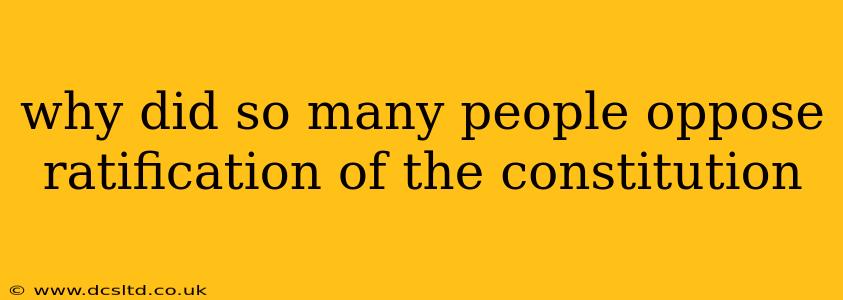The ratification of the United States Constitution wasn't a unanimous affair. A significant portion of the population vehemently opposed its adoption, fearing a powerful central government that would infringe upon individual liberties and state sovereignty. Their arguments, largely articulated in the Anti-Federalist Papers, continue to resonate today in discussions about the balance of power in government.
What Were the Main Concerns of Anti-Federalists?
The core concerns of the Anti-Federalists revolved around several key issues:
-
Fear of a Powerful Central Government: Many believed the Constitution granted the federal government too much power, potentially leading to tyranny similar to that experienced under British rule. They worried about the potential for the national government to override state laws and suppress individual freedoms. The lack of a bill of rights specifically protecting individual liberties fueled these concerns.
-
Lack of a Bill of Rights: This was perhaps the most significant objection. Anti-Federalists argued that the Constitution, as it stood, lacked sufficient protection for fundamental rights like freedom of speech, religion, and the press. They feared that without explicit guarantees, these rights could be easily trampled upon by the powerful new federal government.
-
Representation and Distance: The vastness of the new nation and the proposed structure of representation in Congress worried many. They felt that representatives would be too distant from the people they represented, making it difficult for citizens to hold them accountable. Concerns existed about the potential for the elite to dominate the government at the expense of ordinary citizens.
-
State Sovereignty: The Anti-Federalists strongly valued state sovereignty and feared that the Constitution would significantly weaken the power and autonomy of individual states. They preferred a weaker central government where power remained primarily with the states.
-
Economic Concerns: Some Anti-Federalists worried about the potential economic consequences of the Constitution, particularly concerning taxation and the potential for the federal government to favor certain economic interests over others.
What specific arguments did the Anti-Federalists use?
Anti-Federalist arguments varied across regions and individuals, but some common themes emerged:
-
Brutus No. 1: This influential Anti-Federalist essay warned against the dangers of a large, centralized republic, arguing it would be too distant and unresponsive to the needs of the people. It emphasized the importance of small, localized governments where citizens could directly participate in decision-making.
-
Concerns about the Necessary and Proper Clause: The Anti-Federalists viewed the Necessary and Proper Clause (Article I, Section 8, Clause 18) as a potential source of unchecked power, allowing Congress to expand its authority beyond what was explicitly stated in the Constitution.
How did these concerns lead to compromise?
The concerns of the Anti-Federalists ultimately led to a crucial compromise: the addition of the Bill of Rights. The promise of amendments protecting fundamental individual liberties was essential to securing ratification in many states. The Bill of Rights, comprising the first ten amendments to the Constitution, addresses many of the Anti-Federalists' key concerns, guaranteeing protections for freedom of speech, religion, the press, and other essential rights.
What is the lasting impact of Anti-Federalist concerns?
The concerns raised by the Anti-Federalists remain relevant today. The ongoing debate about the balance of power between the federal government and individual states, the protection of civil liberties, and the accountability of elected officials are all echoes of the arguments that shaped the early years of the American republic. Their legacy reminds us of the importance of vigilance in safeguarding individual freedoms and ensuring that government remains responsive to the needs of its citizens.
Additional Questions Regarding the Opposition to Ratification:
What role did geography play in the opposition to the Constitution?
Geographic factors played a significant role. Larger, more populous states tended to favor ratification due to their stronger representation in the new government. Smaller states, fearing their voices would be drowned out, were more hesitant. Furthermore, the distance between the federal government and the citizens in different regions contributed to anxieties about representation and accountability.
Were all Anti-Federalists opposed to a strong central government?
No, not all Anti-Federalists were inherently opposed to any central government. Their opposition stemmed from concerns about the degree of central power and the lack of sufficient safeguards for individual liberties and states’ rights. They favored a balance of power that prioritized state sovereignty and protected citizens from potential tyranny.
How did the Federalist Papers counter Anti-Federalist arguments?
The Federalist Papers, a series of essays written by James Madison, Alexander Hamilton, and John Jay, served as a powerful counter-argument to Anti-Federalist critiques. They argued that the Constitution's checks and balances would prevent tyranny, that a large republic was actually more likely to protect individual liberties, and that a strong central government was necessary for national unity and security. Their eloquent and persuasive arguments played a crucial role in winning support for ratification.
